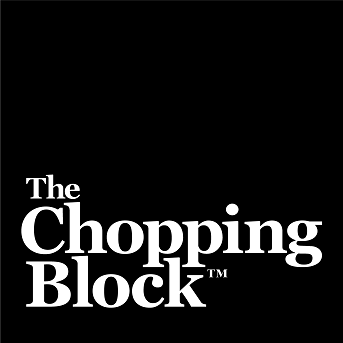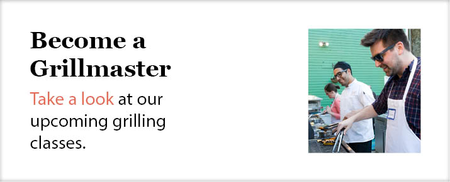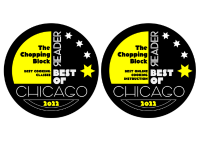With summer in full swing, grills are fired up and adult beverages are flowing during all of the weekend cookouts that go on during this time of year. Grilling is by far my favorite way to prepare food, and there are also some health benefits to grilling.
Grilling meat will actually reduce the fat content of the meat, as the fat cooks out and drips through the grates. Frying foods in oil will do the exact opposite, and even frying meat in zero-calorie spray or baking it still allows the meat to cook in its own fat instead of dripping away. In general, grilling will keep the calories of meat lower than other preparation methods (besides boiling, but even I don’t enjoy the taste of boiled chicken, and I’m a bodybuilder).
It’s not just meat that grilling can actually make healthier. The high heat of the grill helps vegetables lock in some of their vitamins and minerals better than other cooking methods. However, it's important to note that eating a ton of food with a lot of char on it probably isn’t the best idea, as the burnt parts may be carcinogenic in large amounts. If you've got a piece of meat that's extremely burnt or you let a vegetable catch fire, it might be wise to toss the veggie or cut off the very charred part of the meat. It's not a big deal if you eat a burnt piece of food every once in a while, just try not to overcook your food on the grill.
This past weekend, my girlfriend and I decided to take The Chopping Block’s Global Ribfest grilling class as neither of us have ever grilled ribs before. We learned how to grill 3 different styles of ribs:
- Sweet and Spicy Smoked Baby Back Ribs,
- Thai Coconut Curry-Glazed Spare Ribs, and
- Jerk-Rubbed Country Ribs with Mango Barbecue sauce.
We grilled the ribs, prepared the sauces for each and also made a salad to go with each style of ribs. It was an awesome experience, and I highly recommend anyone who enjoys ribs to check out this class!
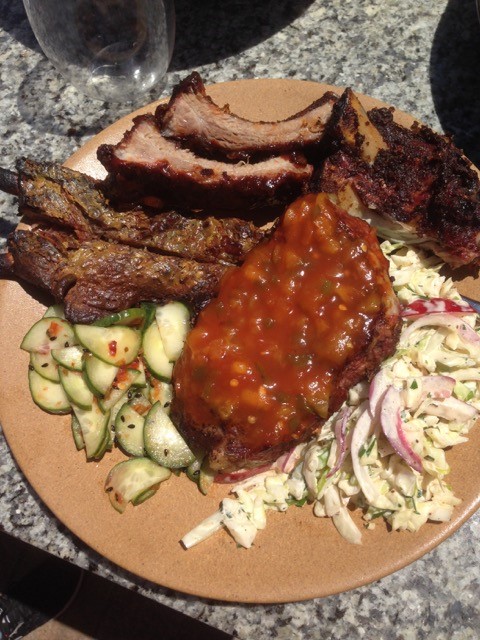
When grilling, you are using the “leanest” preparation method, so you have a ton of options on how calorically dense you want this meal to be. If you’re looking to keep the calories as low as possible, you could simply forgo the barbecue sauce and use a dry rub on the ribs, as the seasoning won’t add any extra calories. You could lightly apply some barbecue sauce to only slightly raise the calorie content, or if you’re like me, you can slather on that barbecue sauce and enjoy yourself! If we’re being honest here, who wants to go to a cookout and not have some saucy ribs washed down with a few beers?
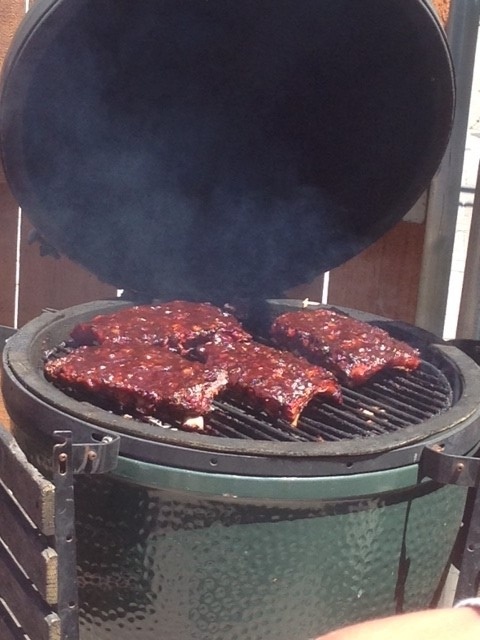
But just because you go to a cookout and overindulge doesn’t mean you should throw your diet out the window! In fact, with a little bit of planning you might not gain any weight at all from feasting on a Saturday afternoon (within reason, obviously.) Like I’ve stated in the past, all that matters as far as weight loss goes is that you consume less calories than you burn off. It really doesn’t matter if you look at this day by day or weekly totals for calories, so for myself and for most of my clients I recommend eating a little less on the weekdays to make up for eating a little more at social gatherings on the weekend.
If it’s Monday and you know you’re going to a cookout on Sunday, doing something as simple as eating 100-200 calories less of carbs and/or fats would give you 600-1200 extra calories in your budget for Sunday! Ideally you would keep your protein the same and still get in your fruits and veggies and reduce carbs and fats from other sources. That calorie reduction could be as simple as having one less snack a day, forgoing dessert, or cooking your meals with zero-calorie spray instead of olive or coconut oil.
You can even take this a step further by adding in a special circuit type workout the night before or the morning of your cookout. Pick a couple exercises for each muscle group and perform 3-4 sets of 15-20 reps of each exercise and rotate through the exercises in circuit format.
Here’s an example:
- Circuit 1: Squat, Chest Press, Row, Bicep Curl
- Circuit 2: Dead lift, Shoulder Press, Pulldown, Tricep Extension
- 3 rounds through each circuit, 15 reps per exercise
Performing high repetition sets of weight training exercises will deplete a good chunk of the stored carbs (glycogen) in the muscles that are worked. When you consume your barbecue sauce and other carbs at the cookout, the first place those carbs will go will be to fill the muscle tissue up; they’ll be much less likely to be stored as fat if your glycogen levels are low.
You’ll also want to keep your fat intake relatively low beforehand especially if you're drinking, as your body will easily store fat while it’s metabolizing the alcohol you consume. If you know you’ll be grilling veggies or making tasty salads (like the Mediterranean Vegetarian: Grilled! class), you don’t have to worry about getting as many veggies in beforehand. But I always suggest to my clients that prior to a big social gathering, they should aim to get in some protein, vitamins and minerals via fruits and veggies so that they've covered the nutrient side of things, and let the event cover the remaining calories for their day.
Now that you’ve got a couple additional health reasons to grill and some strategies to keep your weekend from being derailed by overindulging, get to grilling! If you want a crash course in grilling, Grilling Boot Camp is a two-day intensive class that covers it all. The last session of the summer coming up in a couple weeks still has seats available, so reserve yours now.
